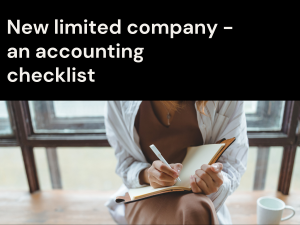Small business owners should ask a professional accountant a few questions to make sure they are a good fit for their limited company before hiring them.
Check out their website to see what services they offer first. This might assist you in figuring out if they have the relevant experience. Many of these questions may already have the answers available on their website.
Selecting the ideal accountant can be a lifesaver for a small business owner. They can provide guidance, finish your company’s accounting, and support with creating accounting statements such as the balance sheet, profit and loss statement, company returns, management reports and tax filing.
Regularly speaking with your accountant will help you make wise decisions that will ultimately speed up the growth of your firm.
But it might be challenging to know what questions to ask without accounting experience.
For this reason, we’ve compiled a list of questions to ask your accountant with an explanation of their importance.
Refer to your business structure to find out what you need from your accountant
It’s essential to take the time to identify your accounting needs in detail before speaking with any potential accountants.
Do you, for example, want an expert accountant in some field? Is your business an international one? Are you required to give a third party your financial statements? Do you only need annual accounts prepared by an accountant, or do you also need monthly management accounts?
Once you know what you need from your accountant, you should take a look at the list below of what you should be asking of them!
6 questions to ask your accountant if you own a limited company
What financial records should I keep?
In order to file taxes, gauge profitability, and obtain funding, you must keep track of your business’s financial records. Additionally, you should always have records on hand in case there is an audit. You can ask an accountant what records your company requires. Some typically include:
- Invoices
- Expenses and receipts
- Bank statements
- Payroll records
- Business tax returns
Your accountant will be able to tell you how long you need to retain each sort of record and if you can preserve them as electronic files or need to maintain them in paper form.
Using cloud accounting and payroll software is a great way to maintain track of your records. Your accountant will appreciate it as well.
It’s best if your accountant uses the same software so you can collaborate to keep track of the numbers, your records, and more.
How should I prepare for tax season?
Your business taxes can be filed and submitted on your behalf by an accountant. This involves submitting all of those bothersome accounting documents as well as paying your income tax or corporation tax obligations to the appropriate authorities.
Ask your accounting firm what data you need to collect in advance for them so that tax season will go smoothly for both of you. Ask them also how you may organise your records more effectively to make tax filing simpler (e.g., using accounting software). Your accountant will finish the tax forms quicker if your records are more organised.
How can I better manage cash flow?
Small businesses need to keep a healthy (and positive) cash flow. Ask your accountant how you may better manage your own business cash flow to prevent it from taking losses.
Your accountant can assist you in comprehending your cash flow, identifying and analysing any issues, and developing a strategy to enhance it. Additionally, you can plan and control your future cash flow with the aid of your accountant by developing a cash flow forecast.
Can you help me grow my business?
Many small business owners aim to expand their business in some way. Ask your accountant how they can assist in the expansion of your company when you speak with them.
Accountants are professionals in taxes and finances. As a result, they are aware of the possibilities that will best foster growth and those that you should avoid. Your accountant can monitor your financial growth and determine what is hindering the success of your company. Additionally, they can aid in your cash flow projection so you can more effectively plan for upcoming costs and possibilities.
Should I register for VAT?
If your company’s annual VAT taxable turnover exceeds a specific threshold (currently £85k), you must register for VAT.
However, you also have the choice to register your firm voluntarily if you fall below this level. Your accountant can explain whether doing this has any benefits for you and what your responsibilities are if you register.
What are some considerations I should consult with you about on an ongoing basis?
You should consult with your accountant more frequently than once a year if you want to build a lasting relationship. By asking them, you can learn which problems that frequently arise in your company you can approach with them.
They will be able to provide valuable insight into a variety of company decisions, including whether to rent or buy equipment, hire a full-time employee or a contractor, and decide between buying or renting office space.
It is worth making the right decision the first time because these decisions will have significant effects on your company.
Looking for an Expert Chartered Accountant for your Limited Company?
At Raw Accounting, we are more than happy to answer the above questions for you and offer advice on any other questions you may have regarding your limited company.
We specialise in small business tax and accounting, and can also help with your bookkeeping and VAT needs.
Contact us today for more information.
Questions to ask your accountant FAQs
Do I need an accountant for limited company accounts?
Although using an accountant to complete your annual accounts and company tax return is not legally required for limited firms, there are many advantages to doing so. Additionally, they can handle the tax registration of new businesses.
What does an accountant do for a limited company?
Some of the tasks an experienced accountant can assist a business owner with are keeping precise financial and accounting records, managing industry specific tax regulations, calculating your expenses and allowances, and creating and submitting Company Tax Reports and Self Assessment tax returns.
Do you pay less tax if you set up a limited company?
Your overall tax and National Insurance (NIC) expenses might be reduced. This is typically the case since the company will usually be able to pay you both salary and dividend income, and dividend income is taxed more favourably than salary because it is not subject to NIC.






